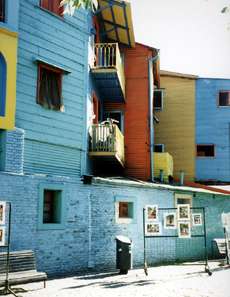 ACORN Argentina, founded in 2006, in Buenos Aires, campaigns for basic human rights such as public housing, basic education, clean air and water and against pollution.
ACORN Argentina, founded in 2006, in Buenos Aires, campaigns for basic human rights such as public housing, basic education, clean air and water and against pollution.
Our achievements include:
A campaign in La Boca, in the southern district of the capital, where ACORN Argentina members organized against eviction and ‘temporary displacement’. The homes of the affected people were slated for demolition by the Institute of Housing that had bought the area in 1991to build higher income housing. Due to the efforts of ACORN Argentina and its members, majority of the homes were saved, although some families lost their homes. Till today, ACORN Argentina continues to fight for the public housing tenants. It has since expanded itself to some of the poorest areas in the city such as Barracas, Constitucion, and Paque Patricios, while consolidating its presence in La Boca.
In 2006 we worked to bring to the attention of the Ministry of the Public Works the failing pipe system in Buenos Aires. The city slopes upwards as it spreads north. The pipe system in the south bears the brunt of water flow when it rains. Additionally, the south is seriously under-maintained. There is very little water pressure, large scale sewage problems and frequent flooding which leads to large pools of stagnant water in areas that have high level of pollution and infrequent trash collection. ACORN Argentina and its members convinced the ministry of public works that this was serious problem for many communities in the south. Now the southern pipe system regularly receives the same cleanings as the north, and the situation has significantly improved.
Over the last one year ACORN Argentina has been conducting a campaign against heavy transport vehicles plying through poor neighborhoods. This campaign emerged out of the concerns of our members around their water and sanitation infrastructure. The campaign targets huge 18 wheel trucks illegally barreling down the narrow streets in poor neighborhoods. The weight of the trucks damages the underground pipe system and, with passage of time, creates fissures in the walls of the dwellings. They also pose safety risk to the local residents, especially children (one child had been killed just around the time we started out our campaign). In a year’s time we have secured promises from both the police and the Transit Ministry to deploy more officers to the enforcement of laws barring the trucks in the neighborhoods. The Transit Ministry is working to make sure that the trucks are clearly directed to appropriate routes and fines get imposed on the errant trucks.
ACORN Argentina is battling rampant security problems in the poor neighborhoods while simultaneously providing safe educational spaces for children and youth in areas with high rates of drop out, unemployment and illiteracy. We are working with local police officers to increase communication between disconnected neighborhood stations and to encourage relationships between members, communities and police officers in an effort to build trust. We have also asked more patrols, and we are advocating for more funding and increased budget transparency.
Our Kid’s Project addresses the needs of local youth. This is an entirely volunteer based and member-led initiative that provides free classes as well as after-school homework support in Spanish literacy, English, art, music, and dance. This initiative also provides a forum for crucial interaction between the elder members and the under-privileged youth.
ACORN Argentina is working towards the objective that, by the end of 2008, citizens of Buenos Aires will be one step closer to autonomy by finally having a system in place called the Comunas. This system will group current political districts and culturally recognized neighborhoods into 15 comunas. Citizens of Buenos Aires will be able to vote for local representatives who will comprise a Communal Board of 7 members for each comunas. There will be a president of the comunas voted by the people who will then head the Communal Board. This system will not be perfect, but it will allow citizens to have more control over the budget and over the municipal services in the city. ACORN Argentina plans to build a City-wide non-governmental coalition to ensure that this step is taken when Mauricio Marcri (PRO) takes office in 2008, and further steps are taken from then onwards.